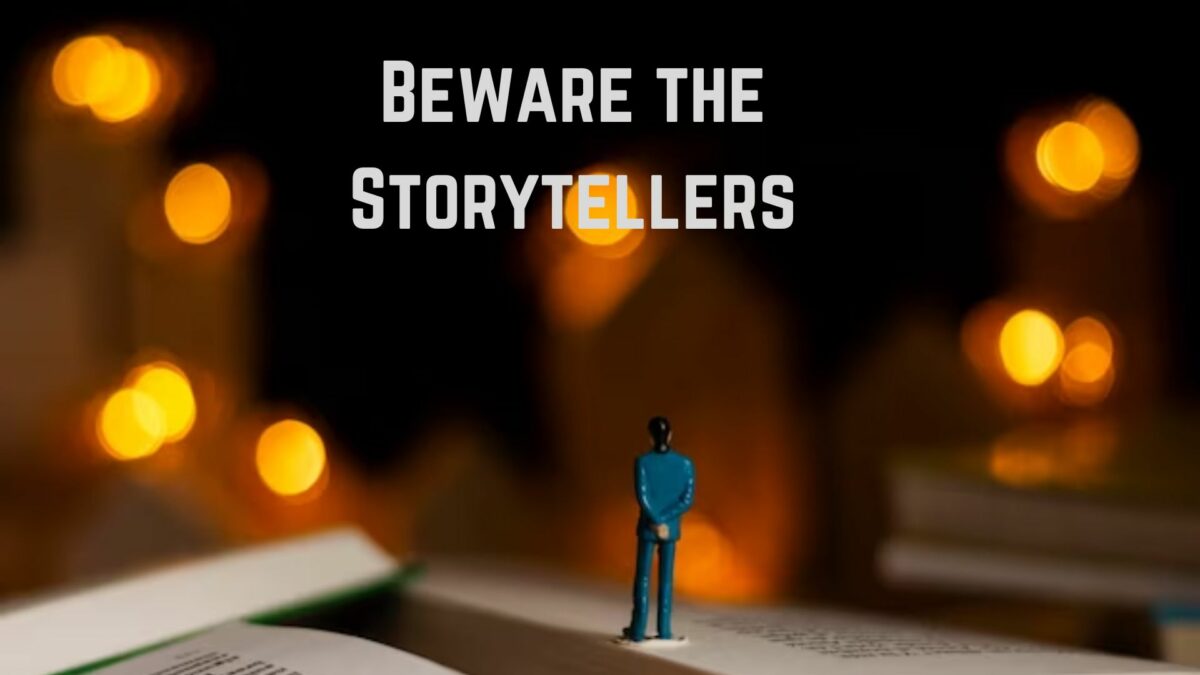“The most dangerous people are those who have been taught some financial literacy.”
–Tyler Cowen

“You can’t learn how to become a doctor by watching Grey’s Anatomy.”
–Charles Barkley
Whenever I meet new people, I invariably tell stories. Whether it’s stories about messing with 419 scammers or funny things that happened when I was deployed to Bosnia, I find that storytelling helps me to connect to people and encourages them to tell their own stories. It’s how we get to learn about each other. Always Beware the Storytellers.
There’s a reason that we feel so connected with each other when we tell stories. Stories help make thoughts and memories more accessible. As we saw in “Help! I’m Being Repressed!”, whenever thoughts and ideas are more accessible in our minds – meaning that they are more easily recalled when we associate them with certain terms, for example – then we have more positive feelings about those ideas.
Dr. Tyler Cowen of George Mason University (see the bottom of the article for the citation) warns about the allure of stories and how they can actually drag us down in our lives. Much like potato chips, the stories give us empty calories that sometimes can do more harm than good.
Why Stories Don’t Always Lead to Happy Endings

As humans, it’s natural for us to look for meaning in our lives. We want to understand the world around us, and know why things happen. But, to truly understand the world would require knowing, processing, and storing an immense amount of information – far more than our minds are capable of.
How do we shortcut knowing everything about the world around us to get to the nuggets of information that are truly valuable?
We use stories.
Stories convey information, and they make complex topics more understandable.
But, at the same time, stories sometimes strip out important information, particularly when they are broken down into small, consumable bites.
Fight the evil big banks!
Win the war on drugs!
Bob Smith is a loon! (my apologies if there are any Bob Smiths who read this…you, sir, are not a loon. It’s the other Bob Smith I’m talking about.)
We want the smallest consumable and actionable piece of information possible that allows us to form opinions and beliefs and take actions.
But, when we do that, we often forget two important aspects of the storyteller.
- The storyteller presents it as a fight between good and evil. As Cowen points out, stories of good versus evil are one of the archetypes that stick most readily in our minds. Rarely are stories that are presented as good versus evil actual matchups of true good versus true evil. The truth is somewhere in between.
- The stories keep us from thinking critically. Rather than assess the facts, consider other angles, or even question the storyteller, we simply accept the stories as gospel truth and move on. When we watch the news, we see talking heads telling us how to think, and they tell us stories about the other side (usually painted with the “good versus evil” brush), and we start to think that way. We remember the stories, and, therefore, we have positive feelings about the positions emphasized in the stories.
Furthermore, as Cowen cautions, we use stories as a proxy for actually doing something. We read the book, and we think that we’ve actually done what the book tells to do because we’ve read the story.
How stories are dangerous to your financial life

If you hear enough stories about how easy something is to do, pretty soon, you start to believe that you can do it just as easily.
You hear the story about how some guy turned $1,000 into millions by investing in options or penny stocks or pork snout futures, and suddenly, you think that you can do the same thing.
You hear the story about the guy who made a fortune in real estate by investing in no money down flips and now he has hundreds of houses and think that if that guy can do it, so can you.
You hear the story about two kids in a garage starting SnapChat, Instagram, etc. and selling the business two years later for a billion dollars, and you think that you should go write some convenience checks on your credit card and you can do the same thing.
You read a bunch of articles on the Internet, and you think that you’ve changed your financial behavior.
Stories can give us a false sense of security about our ability to do things that are much harder than the stories make them out to be. Remember, stories strip out information that is sometimes critical to us making correct decisions. They lead us to think that we’ve inoculated ourselves against the bad behavior when we haven’t.
What to do?
- Question the incentives of the storyteller. Sometimes, people tell stories just to add social lubricant to a situation. But, sometimes, they tell stories to pull you in a certain direction. What is the storyteller trying to do to you?
- Think about the facts, not the narrative. The storyteller is going to strip away some facts, obscure some, and highlight others. Try to think about the facts rather than the conclusions and then draw your own conclusions.
- Ask what story the other side would tell and which one you should believe. As the adage says, there are two sides to every story. It’s your job to think of the other side and to incorporate another perspective before forming an opinion.
- List out tasks and knock them out. Rather than believing that you’ve solved the problem just because you’ve heard a story, actually solve that problem.
- Enlist help. Stories strip out a lot of information and often make tasks seem easier than they really are. Once you dig into solving the problem, you may discover that it is more complex than the story made it out to be or that you don’t have enough information to make smart decisions. Don’t be afraid to ask for help.
If you want to watch Dr. Cowen’s TED talk about stories, you can watch the video below
Author Profile
- John Davis is a nationally recognized expert on credit reporting, credit scoring, and identity theft. He has written four books about his expertise in the field and has been featured extensively in numerous media outlets such as The Wall Street Journal, The Washington Post, CNN, CBS News, CNBC, Fox Business, and many more. With over 20 years of experience helping consumers understand their credit and identity protection rights, John is passionate about empowering people to take control of their finances. He works with financial institutions to develop consumer-friendly policies that promote financial literacy and responsible borrowing habits.
Latest entries
 Low Income GrantsSeptember 25, 2023How to Get a Free Government Phone: A Step-by-Step Guide
Low Income GrantsSeptember 25, 2023How to Get a Free Government Phone: A Step-by-Step Guide Low Income GrantsSeptember 25, 2023Dental Charities That Help With Dental Costs
Low Income GrantsSeptember 25, 2023Dental Charities That Help With Dental Costs Low Income GrantsSeptember 25, 2023Low-Cost Hearing Aids for Seniors: A Comprehensive Guide
Low Income GrantsSeptember 25, 2023Low-Cost Hearing Aids for Seniors: A Comprehensive Guide Low Income GrantsSeptember 25, 2023Second Chance Apartments that Accept Evictions: A Comprehensive Guide
Low Income GrantsSeptember 25, 2023Second Chance Apartments that Accept Evictions: A Comprehensive Guide

